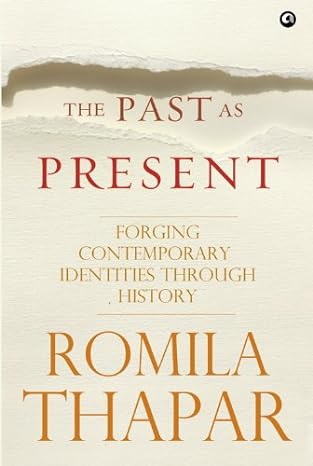” If the past is to be called upon to legitimize the present, as it is so frequently is, then the veracity of such a past has to be continuously vetted. In speaking of the relationship of past and present we seldom stop to think of how much of our present hangs on what we assume to be the actual past.”
Why I Picked This Book ?
The Past As Present is a collection of some fine essays by the eminent historian of our times, Romila Thapar. The book makes a point of how history has been used by vested interests to shape our present and how wrong it is to do so. With so many debates happening around our history and past, I wanted to get an understanding of how a historian views our past and her thoughts on history, so I decided to read this one.
The Book
In her opening chapter on History and the public, the author says, “History is not just a directory of information; it involves analyzing and interpreting this information”. Usually, the analyzing and interpreting part is missing when we deal with history. There are so many aspects that need to be taken into consideration before we come to any conclusion about any historical information. This is what the essays in the book are about. Understanding history in the right way with the right context and trying to interpret it without any bias or agenda.
The book starts with a section called History and the Public, which has essays about the interpretations of early Indian history. Romila Thapar says, “The history of India was constructed in accordance with the nineteenth-century European views on what history should be and what was thought to be Indian history. This colonial view also influenced Indian nationalist perspectives on the past, with some agreement and some disagreement”. Thapar while explaining the interpretation of early Indian history says that colonial historians drew on texts written by upper-caste perspectives of Indian society and extended it to the whole society. Which was largely accepted by the upper and middle classes as they could relate to it. As some of the histories came from some sacred texts, there was a hesitation in critically analyzing their content in a historical manner says Thapar.
Another historical writing encouraged by the colonial version of the Indian past was the extreme religious “nationalisms”. This is something that has been used and manipulated to date to propagate history from the perspective of religion. Indian history for some is the history of the Hindu religion only rather than the history of the Indian subcontinent.
As you move along, the book has some fine essays on the need for healthy debates and discussions among historians, archeologists, linguists, social scientists, geologists, and other experts regarding the history and past. This will make sure that we get all the expertise and perspectives in order to come to a conclusion about any historical event or site.
There is a growing trend in our society to force everyone to believe or present everyone with one kind of history. Any alternate views are not tolerated and are sometimes banned. The case in point is the various versions of Ramayana in different parts of the country, but the stress is given to Valmiki or Tulsi Ramayana ignoring or sometimes negating the other versions. Thapar says this does not augur well for history.
“Identities are neither timeless and unchanging, nor homogenous, nor singular as maintained in the nineteenth-century notion of civilization. Cultural nationalism is a constituent of every nationalism. It now resonates in many parts of the world wherever societies have experienced nationalism. Understanding the construction of this nationalism requires familiarity with the pre-modern history on which it claims to draw, although those that claim it frequently lack expertise in its study.”
The book has some essays that track the history through the history of women and their perspectives. How a society treats its women tells a lot about the society, do we have enough examples of women in our history? What was the condition of women in our society at various points of times in history? What is written in our sacred texts about women? There are essays that try to answer all the questions and much more.
All in all the book has some really interesting and insightful essays about history and how it has been co-opted by politicians and religious leaders over the years. The book warns about how this practice of co-opting history for political gain is not only detrimental to the documentation of correct history but to our present and future as well. A great book to read if you enjoy reading Indian History.
About The Author
Romila Thapar is Emeritus Professor of History at the Jawaharlal Nehru University, New Delhi. She has been General President of the Indian History Congress. She is a Fellow of the British Academy and holds an Hon D.Lit. each from Calcutta University, Oxford University and the University of Chicago. She is an Honorary Fellow of Lady Margaret Hall, Oxford and SOAS, London. In 2008 Professor Thapar was awarded the prestigious Kluge Prize of the US Library of Congress, which honours lifetime achievement in studies such as history that are not covered by the Nobel Prize. –This text refers to an out of print or unavailable edition of this title.
Our Verdict
The Past As Present –Forging Contemporary Identities Through History is an insightful, informative and interesting read for anyone who enjoys reading history. A book that tells us how history or the past is appropriated to forge a particular identity and used by people in power for their benefit.
